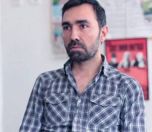His trial is postponed for a fifth hearing on Aug. 10, when two separate cases against Tarhan under the same charge -persistence in disobedience- will be merged. It is expected that the judges will reach a final verdict in this hearing.
The situation of the objector -who has been kept in solitary confinement for the last 15 days- seemed well and the hearing was attended by a group of Tarhan's supporters from home and overseas.
Tarhan's case
Mehmet Tarhan made a press statement and announced that he is a conscientious objector on October 27, 2001. He said he would not kill, he would not die and thus would not become anyone's soldier. Tarhan is a homosexual and views the medical certificate deeming him "disabled" as evidence that in fact the state itself is disabled.
Because Turkey doesn't recognize the status of "conscientious objector," Mehmet was legally seen as a deserter. But Turkey's policy of "ignoring" some 70 people including us, who have announced being conscientious objectors, changed on April 8, 2005.
In the 15-year-old history of conscientious objection in Turkey, three people have been charged with this offense. All three of them were released at different stages of different trial procedures. Although their addresses were known, none of the conscientious objectors were recalled to the army. This issue is Turkey's weakness. The state would never dare to let the conscientious objectors trigger a debate about the military or military service, which are both taboos in Turkey.
On April 8, when Mehmet refused to sign any documents at the Izmir Military Recruitment Office, the deadlocked bureaucracy let the incoherent legal system solve the problem. Mehmet was first transferred to the military corps in Tokat, then to the Sivas Military Jail. The course of his life sentence was thus drawn out.
Although Mehmet repeated on a number of occasions that he is a conscientious objector, he was charged with "insisting on disobeying orders in front of assembled recruits." He was attacked by prisoners who were provoked by the prison administration, he was blackmailed and threatened. Although he openly stated he is a homosexual, he was forced to undergo physical examinations.
Ten soldiers kicked and stamped him, and cut his hair and beard. He was locked into a solitary confinement cell. He began self-mutilation and a hunger strike to protest against discrimination and bad treatment. He also demanded that his conditions be improved.
He stood the third hearing of his trial on June 9. He was released pending the outcome. Because he was persistently referred to as a "soldier" he was sent again to the Military Recruitment Office, then to the corps, and then to prison. He ended his hunger strike after 28 days when some of his demands were met.
The sword of military discipline continues to hang over Mehmet's head, although he is a civilian with a free conscience. A day before his hearing on July 12, his hair and beard was forcibly cut again. He is being called 'Infantryman Mehmet Tarhan' at every occasion and is being subjected to psychological torture. Although his 28-day hunger strike has in fact ended, he refuses to take any food because all dining hours are specifically organized for the "infantrymen." Mehmet who couldn't be disciplined through orders, is deliberately being forced to continue his hunger strike.
The hearing on July 12 became the new episode in the life-sentence drama. The hearing was postponed to August 4, when the first case will also be reviewed. The two cases were combined. If Mehmet Tarhan gets released in this trial too, they also will get confused about the number of cases to be combined. Will it emerge that the paper at the state's stationery office is as abundant as the stubbornness of the objectors?
Legal system is the name of inconsistency
While "inciting armed rebel against the indivisible unity of the state" is punished with 15-20 years in prison, Mehmet, who only refused to become a part of the army, is being quietly sentenced to life in prison. It is now obvious that Mehmet may be forced to stay in prison in an isolated cell. His only privilege compared to those legally sentenced to a life in prison is the fact that he can travel from Tokat to Sivas between hearings.
Militarism is justifying the life sentence through consecutive and persistent 3-month prison sentences. The state is overlooking the principles that a defendant cannot be charged with an inactive crime more than once and that military jurisdiction cannot be applied to civilians. It can clearly be seen from their actions that their only aim is to isolate and separate the sentences.
They clearly can't accuse conscientious objectors of murder. There is an unnamed struggle, which is not based on law, between Mehmet and a group of people who support him, and the state. The struggle being carried out by the conscientious objectors is not being organized by an armed or unarmed, or legal or illegal organization. If that was the case, we are sure that would have pleased the state. The state is ready for such struggles. However, the conscientious objectors aggravate them because their actions are open, perfectly legitimate and they are cheerful enough to play children's games at the army's door.
Isn't it clear yet? We will not become anyone's soldier
Mehmet Tarhan and other conscientious objectors are not trying to get away from the military service, to pay money and be exempt from it, or to join one army instead of another. We aim to live in peace with each other and with the nature and we refuse to become anyone's soldier. We refuse to participate in any war because we want to stand by life, not death. Mehmet Tarhan will stand the hearing of the combined cases against him on August 4. This date is an opportunity. Don't act unreasonably anymore just acquit Mehmet.
_______________________________________
* Erkan Ersoz, Conscientious Objector, [email protected]
* Ersan Ugur Gor, Conscientious Objector, [email protected]





